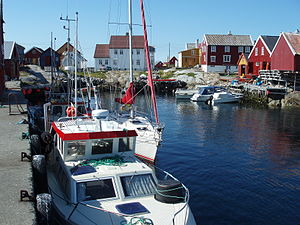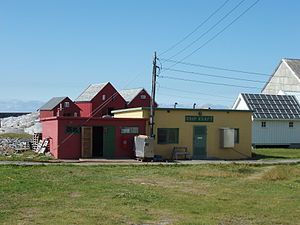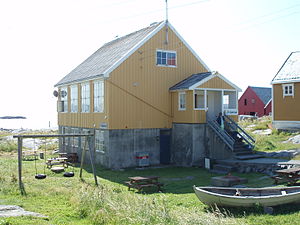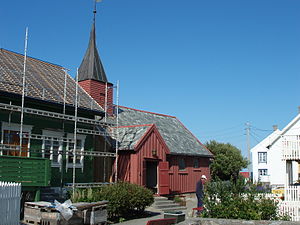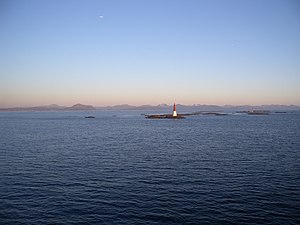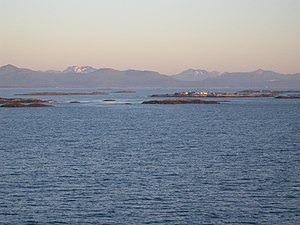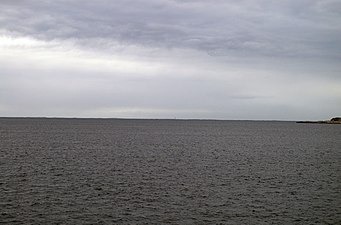Grip (municipality)
Grip Municipality Grip herred | |
|---|---|
 Møre og Romsdal within Norway | |
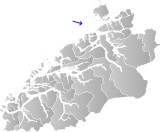 Grip within Møre og Romsdal | |
| Coordinates: 63°13′10″N 7°35′35″E / 63.2195°N 7.5931°E | |
| Country | Norway |
| County | Møre og Romsdal |
| District | Nordmøre |
| Established | 1 Jan 1897 |
| Disestablished | 1 Jan 1964 |
| • Succeeded by | Kristiansund Municipality |
| Administrative centre | Gripholmen |
| Area (upon dissolution) | |
• Total | 0.48 km2 (0.19 sq mi) |
| Population (1964) | |
• Total | 104 |
| • Rank | #744 (last) in Norway |
| • Density | 220/km2 (560/sq mi) |
| Demonym | Gripværing[1] |
| Time zone | UTC+01:00 (CET) |
| • Summer (DST) | UTC+02:00 (CEST) |
| ISO 3166 code | NO-1555[2] |
Grip (Norwegian pronunciation: [ˈɡriːp]) is a former municipality in Møre og Romsdal county, Norway. With a land area of only 0.48 square kilometres (120 acres) and a population of 104, Grip was the smallest municipality in Norway during its existence from 1897 until it merged with Kristiansund in 1964. Grip municipality included all the islands in the Grip archipelago. The administrative centre of the municipality was the one fishing village in the municipality, known as Gripholmen, where the historic Grip Stave Church is located.[3]
History

The formannskapsdistrikt law of 1837 required that every parish in Norway should be constituted as a municipality on 1 January 1838. It also required that parishes composed of a town with a rural district should be divided into two municipalities (a town municipality and a rural municipality). In 1837, the town of Kristiansund and the rural districts of Frei and Grip were part of the same parish. The parish of Frei became its own municipality under the new law, but Grip had no men with the right to vote so it was not considered a municipality, rather it was governed by Frei. Prior to 1884, the right to vote was in Norway was mostly limited to men with property. In a fishing village, such as Grip, where one merchant in the town owned all the houses, nobody had the right to vote, so Grip had no municipal government. Through constitutional changes in 1884, the right to vote was extended to all men who paid taxes. Since the fishermen in Grip paid income taxes, Grip finally had a voting population. Grip municipality was officially incorporated in 1897 with a population of 198 when it was separated from Frei.[4][3]
Grip municipality bought the fishing village from the merchant Ludvig Williamsen in 1909. The entire community had previously been the property of a merchant in Kristiansund, not including the church, school and three private houses. The price of 110,000 kr was financed through a public loan to be paid back in 45 years. The municipality then began selling the houses to their inhabitants. A census in 1910 showed a population of 187.
During the 1960s, there were many municipal mergers across Norway due to the work of the Schei Committee. On 1 January 1964, the municipality of Grip (population: 104) was merged with the town of Kristiansund (population: 17,275) and the Dale area of the municipality of Bremsnes (population: 963) to form a new, larger Kristiansund Municipality.[5]
Name
The municipality (originally the parish) is named after the island of Grip (Old Norse: Grípar) since the Grip Stave Church was built there. The name was first found in existing historical records in 1338 and it is a plural form of the word which makes sense since Grip is an archipelago. The meaning of the name is uncertain, but it may be from the Old Norse verb grípa which means "catch", "seize", or "grip". If this is the case, then it probably refers to the catching of fish here.[6]
Government
While it existed, this municipality was responsible for primary education (through 10th grade), outpatient health services, senior citizen services, unemployment, social services, zoning, economic development, and municipal roads. During its existence, this municipality was governed by a municipal council of directly elected representatives. The mayor was indirectly elected by a vote of the municipal council.[7]
Municipal council
The municipal council (Herredsstyre) of Grip was made up of 13 representatives that were elected to four year terms. The party breakdown of the final municipal council was as follows:
| Party name (in Norwegian) | Number of representatives | |
|---|---|---|
| Local List(s) (Lokale lister) | 13 | |
| Total number of members: | 13 | |
| Party name (in Norwegian) | Number of representatives | |
|---|---|---|
| Local List(s) (Lokale lister) | 13 | |
| Total number of members: | 13 | |
| Party name (in Norwegian) | Number of representatives | |
|---|---|---|
| Local List(s) (Lokale lister) | 12 | |
| Total number of members: | 12 | |
| Party name (in Norwegian) | Number of representatives | |
|---|---|---|
| Local List(s) (Lokale lister) | 12 | |
| Total number of members: | 12 | |
| Party name (in Norwegian) | Number of representatives | |
|---|---|---|
| Local List(s) (Lokale lister) | 12 | |
| Total number of members: | 12 | |
| Party name (in Norwegian) | Number of representatives | |
|---|---|---|
| Local List(s) (Lokale lister) | 12 | |
| Total number of members: | 12 | |
| Note: Due to the German occupation of Norway during World War II, no elections were held for new municipal councils until after the war ended in 1945. | ||
Mayors
- 1897-1910: Andreas Jørussen Grip
- 1911-1922: Peder Edvard Pedersen
- 1923-1925: Thomas Thoresen
- 1926-1928: Peder B. Brunvoll
- 1929-1931: Olaf Kristiansen
- 1932-1934: Peder Edvard Pedersen
- 1935-1937: Olaf Kristiansen
- 1938-1942: Isak Roksvåg
- 1943-1944: Johannes Thomassen
- 1945-1945: Olaf Kristiansen
- 1945-1945: Peder B. Brunvoll
- 1945-1945: Mikael Nerland
- 1946-1947: Kristian Pedersen
- 1948-1961: Mikael Nerland
- 1962-1964: Peder Pedersen, Jr.
Media gallery
- View of the village in 1967
- The south harbour
- Houses on the north side
- Grip power station
- The community house
- The schoolhouse inn
- The altar and triptych
- Lighthouse with fishing village in background
- The fishing village
- Grip lighthouse
- Grip on the horizon seen from neighbour island
See also
References
- ^ "Navn på steder og personer: Innbyggjarnamn" (in Norwegian). Språkrådet.
- ^ Bolstad, Erik; Thorsnæs, Geir, eds. (9 January 2024). "Kommunenummer". Store norske leksikon (in Norwegian). Foreningen Store norske leksikon.
- ^ a b Thorsnæs, Geir, ed. (22 February 2017). "Grip - tidligere kommune". Store norske leksikon (in Norwegian). Kunnskapsforlaget. Retrieved 7 April 2019.
- ^ "Informasjon om Kristiansund" (in Norwegian). DIS Norge. Retrieved 19 May 2019.
- ^ Jukvam, Dag (1999). Historisk oversikt over endringer i kommune- og fylkesinndelingen (PDF) (in Norwegian). Statistisk sentralbyrå. ISBN 9788253746845.
- ^ Rygh, Oluf (1908). Norske gaardnavne: Romsdals amt (in Norwegian) (13 ed.). Kristiania, Norge: W. C. Fabritius & sønners bogtrikkeri. p. 326.
- ^ Hansen, Tore; Vabo, Signy Irene, eds. (20 September 2022). "kommunestyre". Store norske leksikon (in Norwegian). Kunnskapsforlaget. Retrieved 1 January 2023.
- ^ "Kommunevalgene og Ordførervalgene 1959" (PDF) (in Norwegian). Oslo: Statistisk sentralbyrå. 1960. Retrieved 24 April 2020.
- ^ "Kommunevalgene og Ordførervalgene 1955" (PDF) (in Norwegian). Oslo: Statistisk sentralbyrå. 1957. Retrieved 24 April 2020.
- ^ "Kommunevalgene og Ordførervalgene 1951" (PDF) (in Norwegian). Oslo: Statistisk sentralbyrå. 1952. Retrieved 24 April 2020.
- ^ "Kommunevalgene og Ordførervalgene 1947" (PDF) (in Norwegian). Oslo: Statistisk sentralbyrå. 1948. Retrieved 24 April 2020.
- ^ "Kommunevalgene og Ordførervalgene 1945" (PDF) (in Norwegian). Oslo: Statistisk sentralbyrå. 1947. Retrieved 24 April 2020.
- ^ "Kommunevalgene og Ordførervalgene 1937" (PDF) (in Norwegian). Oslo: Statistisk sentralbyrå. 1938. Retrieved 24 April 2020.
- ^ Iversen, Jostein (1998). Grip – et fiskevær gjennom 900 år (in Norwegian). pp. 108–111, 127-128 and 131. ISBN 8299474205.


